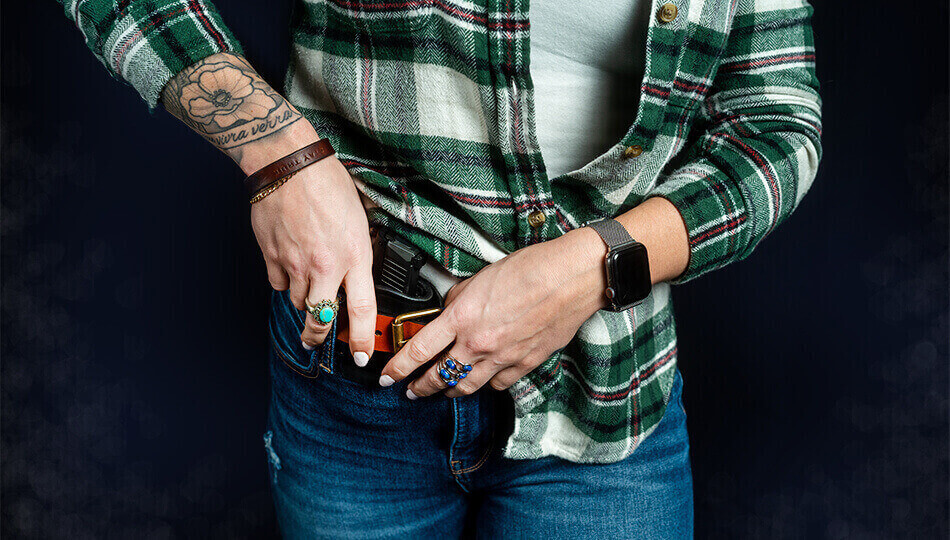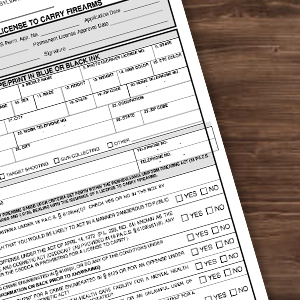
For first-time gun buyers interested in self-defense, the questions surrounding how to get a concealed carry permit can be one of the most confusing parts of their self-defense journey. Complicating the matter further, there’s no standardized application process between all 50 states when it comes to how to get a concealed carry permit. There are even many states where the question of how to get a concealed carry permit isn’t even one that people have to ask themselves. There are 23 states that have passed constitutional carry, which allows residents who meet the necessary requirements, to carry a firearm without a license to carry. It’s important to note that there are restrictions and requirements regarding who can carry and where, as well as how firearms may be carried, in every state, regardless of whether a license to carry is required or not. This is why it’s crucial to educate yourself on the specific laws in your area whenever you decide to carry a concealed firearm.
Can Anyone Carry a Handgun or Are There State Applicant Requirements?
 Each state determines their own license to carry permitting requirements, but there are some federal lawsthat impact whether someone is eligible to even possess a firearm, let alone worry about carrying firearms. For the most part, if someone is unable to walk into a gun store and legally purchase a handgun, they won’t meet the applicant requirements to carry a concealed firearm set forth by any issuing authority in any state. Generally, and in no particular order, the person applying for the concealed carry permit will need to complete the application for the permit, submit to a background check, pay an application fee, and possibly complete some form of firearms training. Something else that needs to be considered is how your state lawsregarding the application process are structured.
Each state determines their own license to carry permitting requirements, but there are some federal lawsthat impact whether someone is eligible to even possess a firearm, let alone worry about carrying firearms. For the most part, if someone is unable to walk into a gun store and legally purchase a handgun, they won’t meet the applicant requirements to carry a concealed firearm set forth by any issuing authority in any state. Generally, and in no particular order, the person applying for the concealed carry permit will need to complete the application for the permit, submit to a background check, pay an application fee, and possibly complete some form of firearms training. Something else that needs to be considered is how your state lawsregarding the application process are structured.
Some states, known as constitutional carry states, have no application process at all. These states allow residents, and in some instances non-residents, to carry a concealed firearm in accordance with the applicable state laws with no application process, and no license to carry, required. It’s important to remember that even though constitutional carry states don’t require a permit, they still have laws governing how, and where, firearms can be carried.
Other state laws require that permits shall be issued to every qualified applicant. These states are known as “shall-issue” states. The application process may look slightly different between each shall-issue state and there are a number of shall-issue states that still provide the issuing authority with limited discretion on which applicants receive a permit.
Finally, there are states that leave the ultimate decision of who receives a carry permit up to the issuing authority. Qualified applicants who meet the permit requirements may be issued a concealed carry permit. These states are known as “may-issue” states. Who does and doesn’t receive a permit in a may-issue state can depend on a number of factors, and the application process can be extremely difficult. Certain may-issue states, such as Hawaii, issue so few carry permits to those that apply that some might consider it an outright ban on concealed carry
Are State Permitting Policies & Issuing Authorities the Same Everywhere?
 While there are many states that handle things in a similar fashion, there’s no uniform permitting policy across the country. Issuing authorities across states also vary, including local law enforcement agencies, sherriffs’ offices, and state police issuing permits depending on the jurisdiction. The state laws regarding permitting policies and issuing authorities can usually be found on the webpage for each state’s attorney general. If you have questions regarding your state’s concealed carry permitting process or issuing authority, check with your Independent Program Attorney to make sure you have the most up-to-date information available.
While there are many states that handle things in a similar fashion, there’s no uniform permitting policy across the country. Issuing authorities across states also vary, including local law enforcement agencies, sherriffs’ offices, and state police issuing permits depending on the jurisdiction. The state laws regarding permitting policies and issuing authorities can usually be found on the webpage for each state’s attorney general. If you have questions regarding your state’s concealed carry permitting process or issuing authority, check with your Independent Program Attorney to make sure you have the most up-to-date information available.
Enjoying this content? Find out how you can get more sent straight to your inbox.
How Do I Find Out if I Meet the Federal Concealed Carry Requirements?
Unless you fall under the provisions of H.R. 218, there’s nothing that acts as a federal concealed carry permit and H.R. 218 itself isn’t a concealed carry permit. H.R. 218, also known as the Law Enforcement Officers Safety Act of 2004, allows specific qualifying individuals, namely current or retired law enforcement officers, the ability to carry most firearms concealed, in spite of any state or local law. It’s important to note that there are specific requirements to be eligible for H.R. 218, and H.R. 218 doesn’t generally allow an individual carrying a firearm to ignore state or local laws concerning where it’s legal to possess a firearm inside of the state.
Should I Still Take a Concealed Carry Course from a Law Enforcement Officer if It Isn’t Required for the Application Process?
 If you decide to pursue a license to carry, it’s a good idea to seek as much education as your resources allow, even if a training class isn’t required. A good concealed carry class will include state-specific information regarding use of force law, as well as helpful lessons on how to safely incorporate a firearm into your life. Whether it’s misunderstanding use of force law during an incident, or a gun accidentally firing, mistakes involving a gun come with the potential for life-altering consequences.
If you decide to pursue a license to carry, it’s a good idea to seek as much education as your resources allow, even if a training class isn’t required. A good concealed carry class will include state-specific information regarding use of force law, as well as helpful lessons on how to safely incorporate a firearm into your life. Whether it’s misunderstanding use of force law during an incident, or a gun accidentally firing, mistakes involving a gun come with the potential for life-altering consequences.
The potential for life-altering consequences is why well-prepared gunowners choose a membership with U.S. LawShield® to help provide them peace of mind. U.S. LawShield members enjoy access to our non-emergency hotline, where Independent Program Attorneys answer firearm or use of force law related questions, a 24/7/365 Attorney-Answered Emergency Hotline, and more…
How to Get a Concealed Carry Permit FAQ’s
Your Protection Starts Here!
The information provided in this publication is intended to provide general information to individuals and is not legal advice. The information included in this publication may not be quoted or referred to in any other publication without the prior written consent of U.S. LawShield, to be given or withheld at our discretion. The information is not a substitute for, and does not replace the advice or representation of a licensed attorney. We strive to ensure the information included in this publication is accurate and current, however, no claim is made to the accuracy of the information and we are not responsible for any consequences that may result from the use of information in this publication. The use of this publication does not create an attorney-client relationship between U.S. LawShield, any independent program attorney, and any individual.




Leave A Comment